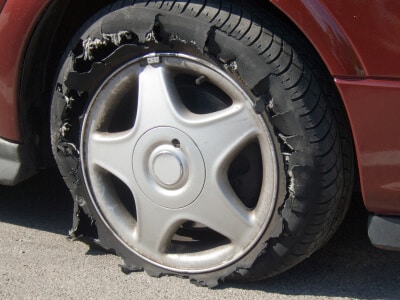The National Highway Traffic Safety Administration announced that Chrysler has initiated a recall for certain model year 2012 Dodge Charger SRT8s and Chrysler 300 SRT8s for “failing to comply with the requirements of federal motor vehicle safety standard[s]” that address the vehicles’ Tire Pressure Monitoring System (TPMS). The tire safety system on these vehicles does not warn drivers when a tire has dropped 25 percent below its recommended pressure, posing a serious crash risk.
The recall explains that instead of notifying customers when their tires have reached 24 psi, the vehicles only warn drivers after the vehicle tire pressure reaches 22 psi. NHTSA goes on to explain that “underinflated tires can result in tire overloading and overheating, which could lead to a blowout and possible crash.”
A 2011 article on early signs of tire Failure from Consumer Reports explains that as the only part of a car physically in contact with the roadway, tires are one of the essential components affecting “overall highway safety.” Besides sapping fuel economy, control, and tire life, under inflation puts drivers at a major risk for catastrophic injury. The report explains that a loss of as little as 4 psi can put drivers at risk.
Chrysler’s TPMS defect presents a particularly large threat to consumers because of the recent trend where most drivers no longer regularly check their tire pressure. A safety report from the NHTSA explains that a September 2000 survey found “71 percent of the respondents stated that they check the air pressure in the vehicles’ tires less than once a month.” This means drivers waiting for the TPMS warning of these recalled Chrysler vehicles to kick in are highly vulnerable to Chrysler’s vehicle defect.
According to the NHTSA, manufacturers say their tires typically lose 1 psi every month due to “natural leakage and permeation.” Furthermore, another 1 psi is lost for every 10 degree Fahrenheit drop in the ambient air temperature. The safety announcement also explains that contact with road debris may result in a slow leak which allows the tire pressure to gradually dip into a hazardous range.
This recall affects approximately 300 vehicles manufactured from May 2, 2011 to November 17, 2011. Chrysler explains that beginning with their model year 2008 light vehicles, they introduced the TPMS to comply with the new “vehicle safety standard established by the National Highway Traffic Safety Administration (NHTSA) requiring installation of Tire Pressure Monitoring Systems as mandated by the Transportation Recall Enhancement, Accountability, and Documentation (TREAD) Act.”
The NHTSA explains that the TREAD Act “was enacted on November 1, 2000, as a direct consequence of hearings before the Committee on Energy and Commerce on the safety of Firestone tires and related matters.” During these hearings, the Committee felt that the NHTSA “could have detected the problems with the tires sooner if it had obtained reports about the tires’ problems in a timelier manner.”
CBS News explains the 2000 Firestone ATX tire defect referenced in that legislation eventually resulted in 174 deaths and over 700 injuries. The dangerous tread separation on those tires also led to a massive recall, substantial settlement payments, and the end of a 95-year-long relationship between Ford and Bridgestone/Firestone.
Chrysler is expected to begin their safety recall in February. The company will notify owners and dealers will make the reprogramming repairs to the vehicles’ TPMS free of charge.


